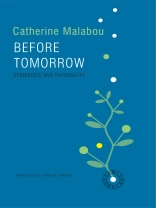Is contemporary continental philosophy making a break with Kant? The structures of knowledge, taken for granted since Kant�s Critique of Pure Reason, are now being called into question: the finitude of the subject, the phenomenal given, a priori synthesis. Relinquish the transcendental: such is the imperative of postcritical thinking in the 21st century.
Questions that we no longer thought it possible to ask now reemerge with renewed vigor: can Kant really maintain the difference between a priori and innate? Can he deduce, rather than impose, the categories, or justify the necessity of nature? Recent research into brain development aggravates these suspicions, which measure transcendental idealism against the thesis of a biological origin for cognitive processes.
In her important new book Catherine Malabou lays out Kant�s response to his posterity. True to its subject, the book evolves as an epigenesis the differentiated growth of the embryo for, as those who know how to read critical philosophy affirm, this is the very life of the transcendental and contains the promise of its transformation.
Cuprins
Translator’s Preface: Epigenesis of Her Texts
Foreword
Introduction
Chapter 1: Paragraph 27 of the Critique of Pure Reason
Chapter 2: Caught Between Skeptical Readings
Chapter 3: The Difference Between Genesis and Epigenesis
Chapter 4: Kant’s ‘Minimal Preformationism’
Chapter 5: Germs, Races, Seeds
Chapter 6: The ‘Neo-Skeptical’ Thesis and its Evolution
Chapter 7: From Epigenesis to Epigenetics
Chapter 8: From Code to Book
Chapter 9: Irreducible Foucault
Chapter 10: Time in Question
Chapter 11: No Agreement
Chapter 12: The Dead-End
Chapter 13: Towards an Epigenetic Paradigm of Rationality
Chapter 14: Can We Relinquish the Transcendental?
Conclusion
Notes
Bibliography
Despre autor
Catherine Malabou is Professor of Philosophy at Kingston University London












